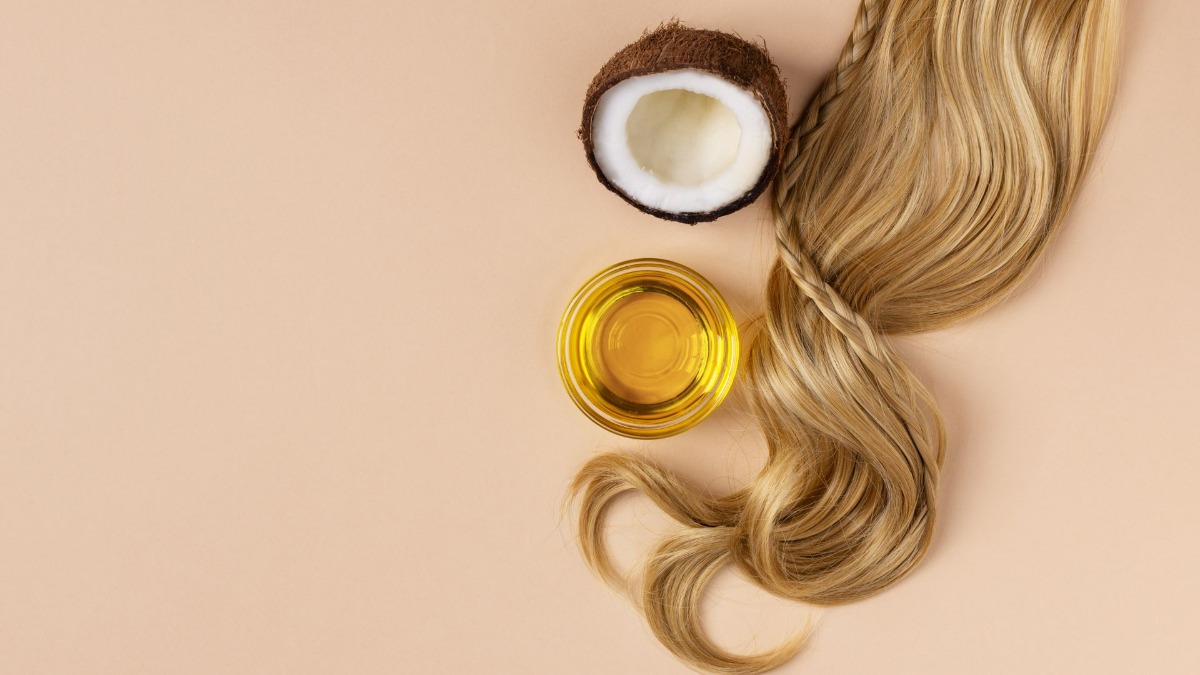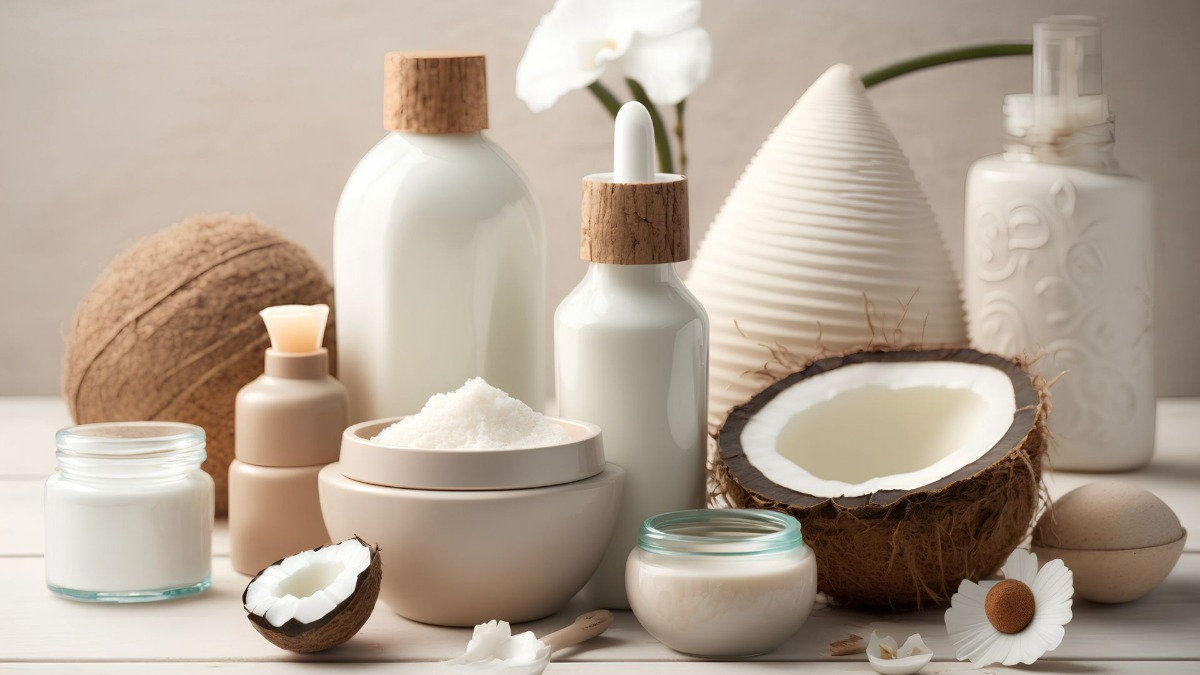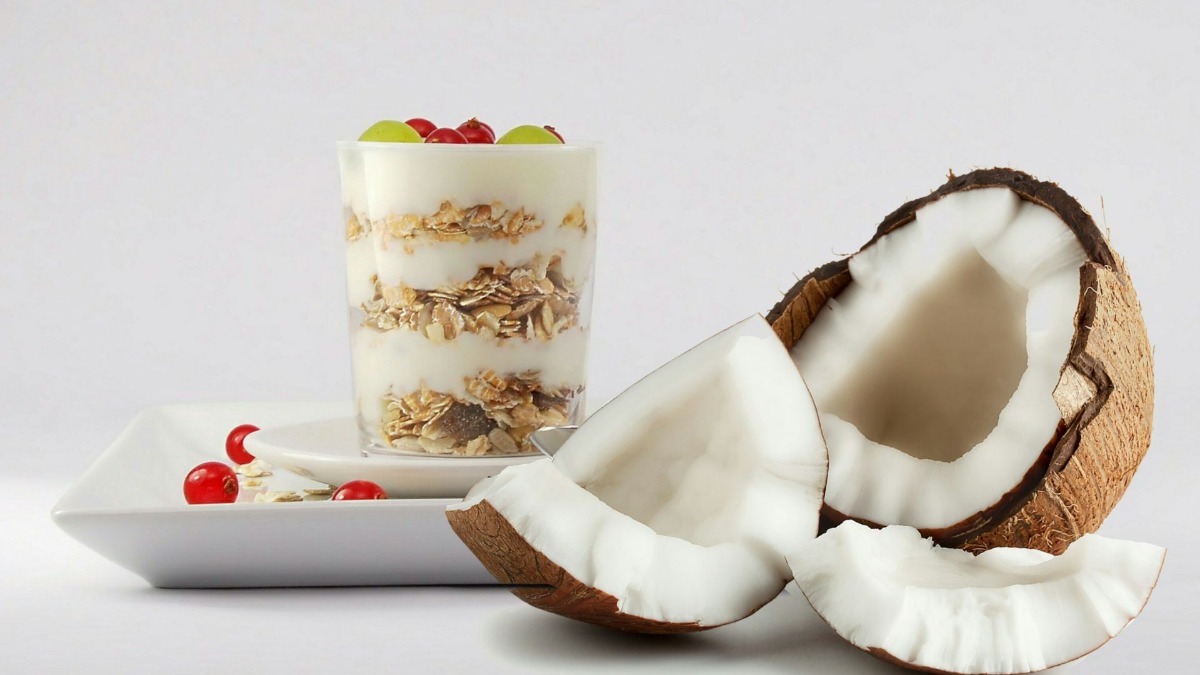The remarkable Benefits of Coconut Oil for Hair, Skin and overall Health
The remarkable Benefits of Coconut Oil for Hair, Skin and overall Health
Coconut oil, a versatile and natural remedy, has gained immense popularity for its incredible benefits in both hair and skincare routines. The oil, derived from the meat of mature coconuts, is packed with essential nutrients and possesses unique properties that make it a true elixir for hair and skin.
In this comprehensive article, we will explore the remarkable benefits of coconut oil, incorporating information from reputable sources such as Medical News Today, Harvard School of Public Health, and Healthline. By delving into scientific research and expert opinions, we aim to provide you with a deeper understanding of the nourishing properties, hair growth promotion, skin rejuvenation, and other remarkable benefits that coconut oil offers. So, let's unlock the secrets to radiant hair and glowing skin by harnessing the power of coconut oil.

Nourishes and Revitalizes Hair
Coconut oil has been used for centuries as a traditional remedy for hair care in many cultures. Its nourishing properties can be attributed to the presence of essential fatty acids, such as lauric acid, and vitamins E and K. These nutrients are known to penetrate the hair shaft, restoring moisture, preventing protein loss, and improving hair texture. As Medical News Today explains, coconut oil can be used as a conditioner, hair mask, or pre-shampoo treatment to leave your hair luscious, manageable, and beautifully hydrated. Bid farewell to dry, damaged hair and embrace the natural shine and vitality that coconut oil provides.
Coconut oil is a natural remedy for dry hair and helps you to gain that soft healthy hair you have been dreaming about. Regular use of coconut oil can help to repair damage from chemical treatments you might have been using before. Because the oil is so soft to the hair and skin, coconut oil can also help sooth the scalp and therefore help prevent dandruff from dry scalp.
Promotes Hair Growth
In addition to its moisturizing benefits, coconut oil has been shown to promote hair growth. The medium-chain fatty acids present in coconut oil can penetrate the hair follicles, stimulating hair growth and enhancing follicle health. This is further supported by the antimicrobial properties of coconut oil, which keep the scalp healthy and prevent infections that can hinder hair growth. Regular scalp massages with warm coconut oil improve blood circulation, ensuring a steady supply of nutrients to the hair follicles and encouraging stronger, faster hair growth. So, if you dream of long, voluminous locks, consider adding coconut oil to your hair care routine.

Coconut oil Hair Treatment
As mentioned above coconut oil can be used for nourishing, revitalizing and growing hair in several ways. But how do you use the oil to revitalise dry hair, dry scalp, brittle hair et cetera? We will help you with a couple of treatments to get you started.
Repairing Damaged Hair:
Repairing damaged hair with coconut oil is a simple and effective process. Follow these steps to make the most of this natural remedy:
-
Choose high-quality coconut oil: Opt for organic virgin coconut oil, or extra-virgin coconut oil, as they are minimally processed and retain the most beneficial properties.
-
Prepare your hair: Before applying the coconut oil, ensure your hair is clean and free from any styling products. Gently detangle your hair using a wide-toothed comb to avoid further damage.
-
Warm the coconut oil: Coconut oil tends to solidify at room temperature, so warm it slightly to make it easier to apply. Place a small amount of coconut oil in a heat-resistant bowl and warm it by immersing the bowl in warm water or using a microwave for a few seconds. Be careful not to overheat the oil.
-
Apply the coconut oil: Section your hair to ensure even distribution of the oil. Start with a small amount and gradually work your way up as needed. Begin applying the oil from the mid-lengths of your hair and focus on the damaged areas, such as split ends or brittle sections. Massage the oil into your hair using gentle, circular motions, paying attention to the ends.
-
Wrap your hair: Once you have applied the coconut oil, cover your hair with a shower cap or wrap it in a warm towel to create a warm and moist environment. This helps the oil penetrate deeply into the hair shaft.
-
Allow the oil to work its magic: Leave the coconut oil on your hair for at least 30 minutes, or ideally overnight for an intensive treatment. This gives the oil enough time to deeply moisturize and repair the damaged hair.
-
Rinse and wash: After the desired time has elapsed, rinse your hair thoroughly with warm water. You may need to shampoo twice to remove any excess oil. Avoid using hot water, as it can strip the hair of its natural oils.
-
Style as usual: Once you have rinsed out the coconut oil, gently towel-dry your hair and style it as desired. You will likely notice increased softness, smoothness, and improved manageability.
Repeat this treatment once a week or as needed to gradually repair your damaged hair. Over time, you should notice a visible improvement in the health and appearance of your hair.
Adding Luster and Shine:
If you desire radiant, glossy hair, look no further than coconut oil. Its nourishing properties and ability to seal the hair cuticle make it an excellent choice for adding luster and shine. By applying a small amount of coconut oil to your hair after styling, you can tame frizz, reduce flyaways, and create a polished, luminous look. After styling do not apply the oil on your scalp because that can create a greasy look. Coconut oils add shine to straight and curly hair.
Remember, while coconut oil can work wonders for damaged hair, it's also essential to address the underlying causes of damage. Minimize heat styling, avoid harsh chemical treatments, and maintain a balanced diet rich in nutrients to support overall hair health.
Coconut Oil for Skincare
Coconut oil's benefits extend beyond hair care and into the realm of skincare. As a natural moisturizer, coconut oil deeply hydrates the skin and leaves it supple and soft. It acts as a protective barrier, locking in moisture and preventing water loss, making it an excellent choice for dry skin. Furthermore, coconut oil is rich in antioxidants, which combat free radicals and reduce signs of aging such as wrinkles and fine lines. Medical News Today emphasizes that using coconut oil as a facial moisturizer, body lotion, or lip balm can transform your skin, restoring its natural glow and radiance.

Soothes and Heals Skin Conditions
But the benefits of coconut oil for the skin don't end there. It also possesses exceptional healing properties, making it an effective remedy for various skin conditions. The anti-inflammatory and antimicrobial properties of coconut oil can help soothe and alleviate symptoms associated with eczema, psoriasis, and dermatitis. It is gentle enough for sensitive skin, providing relief from irritation and redness. Additionally, coconut oil's antimicrobial properties and ability to promote tissue repair can aid in the healing of wounds, cuts, and burns. Its effectiveness as a healing agent has been supported by studies and anecdotal evidence.
Removes Makeup and Cleanses the Skin
Removing makeup and cleansing the skin are essential parts of a skincare routine. Coconut oil offers a natural and effective solution for these purposes. Its emollient properties help dissolve makeup, even waterproof products, effortlessly. When used as a cleanser, coconut oil gently lifts away dirt, impurities, and excess sebum while simultaneously moisturizing the skin. This makes it an excellent choice for those who prefer natural alternatives to harsh makeup removers and chemical-laden cleansers.
Combats Acne and Promotes Clear Complexion
Contrary to some beliefs, coconut oil can be beneficial for acne-prone skin when used correctly. Its antibacterial properties help combat acne-causing bacteria, while its moisturizing qualities prevent the skin from overproducing sebum. It can also aid in reducing inflammation and redness associated with acne breakouts. However, it's important to choose organic, virgin coconut oil and use it sparingly to avoid clogging pores. As with any skincare product, individual responses may vary, so it's advisable to perform a patch test before incorporating coconut oil into your routine.
Relieves Dry and Irritated Skin
Dry, itchy, and irritated skin can be frustrating and uncomfortable. Fortunately, coconut oil's emollient properties make it an excellent natural remedy for soothing and moisturizing dry skin. It forms a protective barrier on the skin, locking in moisture and preventing water loss. Whether used as a body oil, bath additive, or after-sun treatment, coconut oil can alleviate dryness, restore the skin's natural hydration levels, and provide relief from itchiness and irritation.

Gentle and Safe for All Skin Types
One of the remarkable aspects of coconut oil is its versatility and suitability for all skin types. Whether you have dry, oily, sensitive, or combination skin, coconut oil can be incorporated into your skincare routine. Its non-comedogenic nature means it won't clog pores, making it a safe option for those prone to breakouts. However, as with any new skincare product, it's advisable to perform a patch test and monitor your skin's reaction before using coconut oil more extensively.
How to use Coconut Oil in your Beauty Routine
Here's how you can incorporate coconut oil into your beauty routine for several purposes. We want to help you get started with examples of facial moisturizer, body lotion and a lip balm from coconut oil.
Facial Moisturizer:
-
Cleanse your face: Start with a clean face by using a gentle facial cleanser suitable for your skin type.
-
Take a small amount of coconut oil: Scoop a small amount of coconut oil, about a tablespoon of coconut oil, onto your fingertips.
-
Warm the oil: Rub your fingertips together to warm the oil, allowing it to melt and become more easily spreadable.
-
Apply to the face: Gently massage the coconut oil onto your face using circular motions. Focus on dry areas or areas prone to dryness, such as cheeks or forehead. Avoid the eye area if you have sensitive skin.
-
Let it absorb: Give the oil a few minutes to absorb into your skin. If you find that your skin feels greasy, you can take away any excess oil with a tissue.
Body Lotion:
-
Shower or bathe: Start by showering or bathing to cleanse your body and prepare your skin.
-
Towel-dry your body: Pat your skin dry with a towel, leaving it slightly damp. This helps the coconut oil lock in moisture.
-
Take a generous amount of coconut oil: Scoop a generous amount of coconut oil, depending on the size of the area you want to moisturize.
-
Warm the oil: Rub the coconut oil between your palms to warm it up and melt it.
-
Apply to your body: Massage the coconut oil onto your body, focusing on areas that tend to be dry, such as elbows, knees, and feet. Use gentle, circular motions to help the oil absorb into your skin.
-
Allow it to absorb: Give the coconut oil a few minutes to absorb fully before dressing to avoid staining your clothes.
Lip Balm:
-
Take a small amount of coconut oil: Scoop a small amount of coconut oil, approximately the size of a pea, onto your fingertip.
-
Warm the oil: Rub your fingertips together to warm the coconut oil, allowing it to melt slightly.
-
Apply to your lips: Gently apply the coconut oil to your lips, spreading it evenly to moisturize and nourish them. You can also use a clean, small lip brush for precise application.
-
Reapply as needed: Coconut oil is easily absorbed, so reapply it throughout the day as desired to keep your lips hydrated and soft.

Coconut Oil can increase overall Health
The health benefits of coconut oil go beyond just hair and skin care. According to Harvard School of Public Health, the unique composition of coconut oil, which is primarily composed of medium-chain triglycerides (MCTs), can have positive effects on overall health. MCTs are metabolized differently from other types of fats, as they are quickly absorbed by the body and used as a source of energy. Healthline adds that the MCTs in coconut oil can increase the production of ketones, which can be beneficial for individuals following a ketogenic diet or those seeking alternative energy sources for the brain.
Prevent infections and inflammation with Coconut Oil
Studies have also suggested that coconut oil may have antimicrobial properties, helping to fight off harmful bacteria and viruses. This may contribute to improved immune function and the prevention of certain infections. Moreover, coconut oil's potential anti-inflammatory effects have been shown to reduce inflammation markers in the body, which is beneficial for individuals with conditions such as
arthritis.
Research links Coconut Oil to improved hearth Health
Furthermore, coconut oil has been linked to improved heart health. While it is high in saturated fat, Harvard School of Public Health explains that the type of saturated fat found in coconut oil is different from the long-chain fatty acids found in animal products. The MCTs in coconut oil have been shown to increase levels of HDL (good) cholesterol, which may help protect against heart disease. However, it's important to note that moderation is key, as excessive consumption of coconut oil can still contribute to overall calorie intake and potentially lead to weight gain.
Coconut Oil and weight management
Coconut oil's potential benefits for weight loss and appetite control have also been investigated. According to Healthline, some studies suggest that the MCTs in coconut oil can increase feelings of fullness and boost calorie expenditure. However, more research is needed to fully understand the impact of coconut oil on weight management.
While coconut oil offers numerous benefits, it's important to note that individual responses may vary, and it may not be suitable for everyone. As with any new addition to your routine, it's recommended to consult with a healthcare professional or dermatologist if you have any concerns or specific skin conditions.

Remarkable natural remedy
In conclusion, coconut oil is a remarkable natural remedy with versatile benefits for both hair and skin. Its nourishing properties, ability to promote hair growth, and rejuvenating effects on the skin make it a go-to solution for various beauty concerns. By harnessing the power of coconut oil, you can unlock the secret to healthy, vibrant hair and achieve a radiant, youthful complexion. Whether you choose to incorporate it into your hair care routine or skincare regimen, coconut oil offers a wealth of potential benefits. Embrace the wonders of this tropical elixir and experience the transformative effects it can have on your hair, skin, and overall well-being.


 TH
TH

